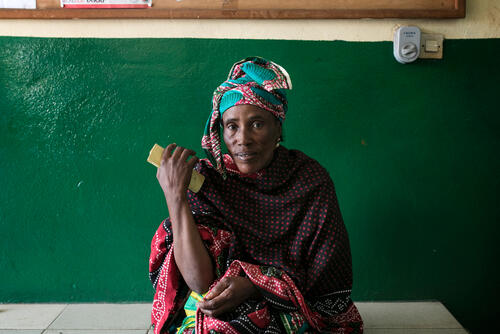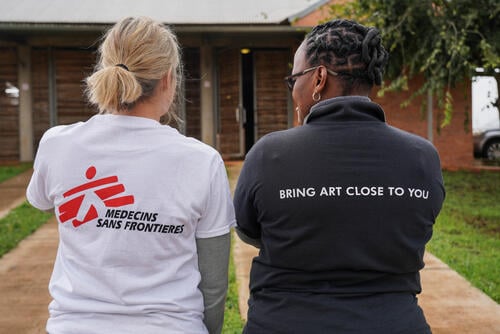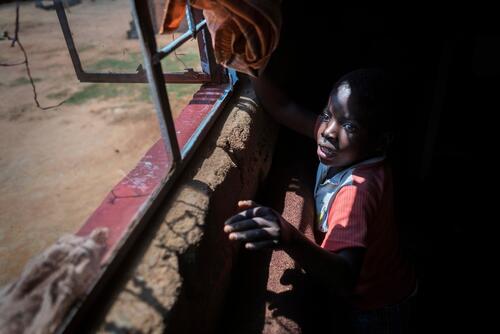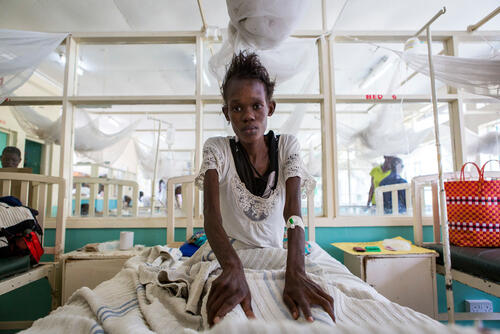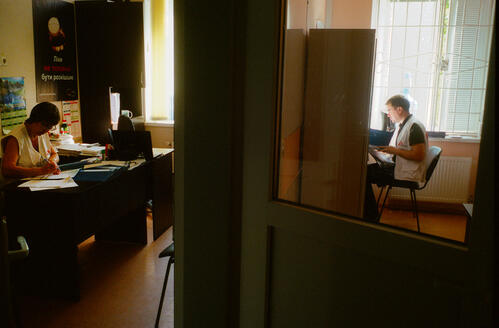The 22nd International AIDS Conference will be held in Amsterdam on 23-27 July.
This year’s theme is Breaking Barriers, Building Bridges, drawing attention to the need of rights-based approaches to more effectively reach key populations, including in Eastern Europe and Central Asia and the North-African/Middle Eastern regions where epidemics are growing.
Follow @MSF_HIV on Twitter for more updates from MSF.
Events
Satellite symposium
Medical care for criminalized populations: scalable or doomed?
Monday 23 July 2018 | 12:30 – 14:30
RAI Amsterdam Forum
Médecins Sans Frontières and Médecins du Monde invite AIDS 2018 participants to discuss concrete solutions to fulfill key populations’ right to health, and progress towards the end of HIV. The symposium will include program showcases, experience sharing, panel discussion and a lively debate on structural issues and critical enablers for key populations health-programming.
Download our flyer for more information:
Side events
Reducing Advanced HIV Mortality: Policy, Experiences, Implementation Progress and Gaps
Monday 23 July | 9:00 - 10:30am
F-room, RAI Amsterdam Convention Centre
A third of people living with HIV (PLHIV) initially accessing care in African low-income and middle-income countries present with advanced HIV, and recent data suggests that up to three-quarters of hospitalised PLHIV are no longer new diagnoses but rather are patients who are antiretroviral therapy (ART)-experienced.
Download our flyer for more information:
Moving from Rhetoric to Action in West and Central Africa: What next for mobilised action of local and international CSOs?
Tuesday 24 July | 09:00 - 10:30am
F-room, RAI Amsterdam Convention Centre
While the HIV response in the West and Central Africa region has received high political attention in the past two years, today, there is still a lack of urgent and ambitious scale up of access to treatment in the region.
Download our flyer for more information:
AIDS Mortality and TB: Civil Society Dialogue
Wednesday 25 July | 09:00 - 10:00am
F-room, RAI Amsterdam Convention Centre
Approximately one third of people beginning treatment for HIV have advanced disease with severe immune suppression, (CD4<200) putting them at very high risk of opportunistic infections (OIs) and death. In 2015 alone, 1.1 million people died of AIDS despite Test and Start policy. The same OIs are associated with AIDS yet there is a lack of OI treatment and diagnosis.
Download our flyer for more information:
Publications
Find here a list of all of MSF's publications released for AIDS 2018.
Briefing documents
Towards Peer-led HIV and SRH Services for Sex Workers and Men Having Sex with Men
Experience from Médecins Sans Frontières in Malawi and Mozambique
Globally, HIV prevalence among female sex workers (SW) and men who have sex with men (MSM) is 12 and 19 times higher, respectively, than in the general population. Eighty per cent of new HIV infections outside of sub-Saharan Africa occur among these key populations and their sexual partners. In high prevalence countries in sub-Saharan Africa, 25 per cent of new infections occur amongst this group.
This briefing document aims to share the experience of MSF programmes in adapting HIV treatment and sexual and reproductive health (SRH) services to the needs of SW and MSM groups in Malawi and Mozambique.
Download the briefing document.
Stopping Senseless Deaths: Overcoming access barriers to affordable, lifesaving diagnostics and treatments for HIV and opportunistic infections
Around 25 per cent of people living with HIV do not know their status and only 59 per cent are receiving treatment. Millions of people still remain at risk for opportunistic infections (OIs) and death.
This technical brief analyses access barriers to affordable, lifesaving diagnostics and treatments for HIV and OIs, including adult and paediatric formulations of dolutegravir – a highly effective and tolerable HIV integrase inhibitor that replaces efavirenz in first-line treatment regimens. Updated antiretroviral drug pricing information is also provided.
Download the briefing document.
For media
Contact
If you're a journalist and would like to contact a media manager, please contact:
Press releases/updates
Update: Meeting the specific needs of key populations living with HIV
Press release: Pfizer and GSK’s HIV/AIDS division, ViiV, prevents children with HIV from getting needed medicine
Abstracts
Below is the list of MSF abstracts being presented at AIDS 2018. To read all abstracts, download the MSF Abstracts PDF below.
- Applying social stress theory to understand HIV care engagement among hospitalised patients with advanced HIV infection in rural Kenya.
Presented at ASSHH 2018 pre-conference. Monday 23/7, 13:30-14:45, University of Amsterdam.
- Field evaluation of the Biocentric® platform for HIV viral load testing utilizing plasma samples in Swaziland: a diagnostic accuracy study
Tuesday 24/7 12:30-14:30, Poster Exhibition area, Hall 1. Category B8.
- Simplifying switch to second line ART: Predicted effect of a policy of defining 1st line failure of efavirenze-based reginems by a single VL > 1000 in sub-Saharan Africa
Tuesday 24/7, 12:30-14:30, Poster Exhibition area, Hall 1. Category C33.
- “We decided not to tell him because he would tell everyone else." Care-giver and young people's experiences of disclosure in Kinshasa, Democratic Republic of Congo
Tuesday-Thursday 24-26/7, 12:30-14:30, Poster Exhibition area, Hall 1. Category D12.
- The first experience with ART adherence clubs in Maputo, Mozambique: An analysis of a second-line ART subcohort
Wednesday 25/7, 12:30-14:30, Poster Exhibition hall, Area 1. Category E47.
- Clinical characteristics and hepatitis C (HCV) treatment outcomes among people who actively use drugs in an HIV cohort in Churachandpur and Moreh districts of Manipur, India
Wednesday 25/7 12:30-14:30, Poster Exhibition area, Hall 1. Category B66.
- Ensuring continuation of antiretroviral treatment in a Test & Treat programme in a rural conflict affected area of South Sudan, the experience of MSF Spain
Wednesday 25/7, 12:30-14:30, Poster Exhibition area, Hall 1. Category E38.
- Implementing test & start program in a rural conflict affected area of South Sudan, the experience of MSF Spain
Wednesday 25/7, 12:30-14:30, Poster Exhibition area, Hall 1. Category E42.
- Successful implementation of HIV self-testing in the rural Shiselweni region of Swaziland.
Wednesday 25/7, 12:30-14:30, Poster Exhibition area, Hall 1. Category E37.
- A “quick pick-up” differentiated model of ART delivery shows good retention in care
Wednesday 25/7, 12:30-14:30, Poster Exhibition area, Hall 1. Category E47.
- "Life continues": Patient, health-care worker and community care worker perspectives on self-administered treatment for rifampicin-resistant tuberculosis in Khayelitsha, South Africa
Wednesday 25/7, 12:30-14:30, Poster Exhibition area, Hall 1. Category B14.
- Operational feasibility and scope of same-day ART initiation under the WHO treat-all approach in the public sector of southern Swaziland- a prospective cohort study.
Wednesday 25/7, 12:30-14:30, Poster Exhibition area, Hall 1. Category C41.
- PrEP for HIV prevention in Shiselweni, Swaziland: Early uptake and month one retention
Wednesday 25/7, 12:30-14:30, Poster Exhibition area, Hall 1. Category C42.
- Treatment outcomes of a short standardized regimen for multidrug-resistant tuberculosis patients co-infected with HIV in Mozambique
Wednesday 25/7, 12:30-14:30, Poster Exhibition area, Hall 1. Category B14.
- 10 years of Community ART Groups (CAG): retention and viral load uptake in Tete, Mozambique
Wednesday 25/7, 16:30-16:45, Forum. Category E47.
- Time to Switch? Outcomes of children and adolescents failing NNRTI regimens
Thursday 26/7, 12:30-14:30, Poster Exhibition area Hall 1. Category B55.
- Expanding use of TB-LAM in HIV+ individuals with CD4 <200: evidence from MSF operational research and beyond
Thursday 26/7, 12:30-14:30, Poster Exhibition area, Hall 1. Category E19.
- HIV prevention and linkage to care among female sex workers in Malawi: Results and lessons learned from the MSF Corridor Project
Thursday 26/7, 12:30-14:30, Poster Exhibition area, Hall 1. Category C53.
- Post Natal Clubs: a differentiated model of care integrating maternal, child health and prevention of mother to child transmission (PMTCT) in Khayelitsha, South Africa
Thursday 26/7, 12:30-14:30, Poster Exhibition area, Hall 1. Category E17.
- Second line ART switching in Mozambique: coverage and time line.
Thursday 26/07, 12:30-14:30, Poster Exhibition area, Hall 1. Category C20.
- Retention-in-care after implementation of a phone-call tracing strategy, in HIV-infected individuals on ART in Guinea
Poster Exhibition area, Hall 1. Category C52.
- Raising awareness of HIV status among learners through school-based testing in King Cetshwayo District, KwaZulu-Natal
Poster Exhibition area, Hall 1. Category E41.
- Routine viral load testing and enhanced adherence counseling for ART monitoring at a public ART centre in Mumbai, India
Poster Exhibition area, Hall 1. Category E.
Download the full abstracts here.



